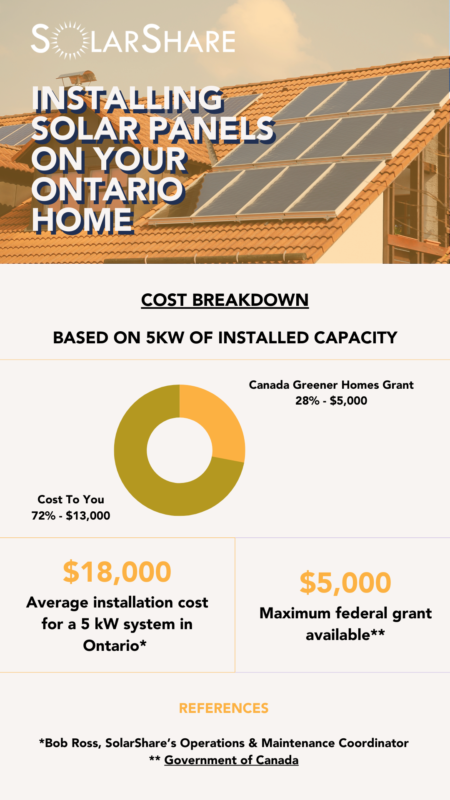Installing Solar Panels on Your Ontario Home
Jan 26, 2023
As our members know, SolarShare offers Ontarians the opportunity to support solar energy in the province without having to own a system themselves. However, people often ask us about how they can install panels on their homes, businesses and properties to reap the rewards of the sun! Here’s what you need to know about going solar in Ontario.
Benefits
The benefits of solar panels go beyond simply generating power. Going solar means:
- Keeping your home cooler in the summer by shading your roof
- Using less electricity for your A/C
- Reducing your carbon footprint
- Going from time of usage to flat rate on your electricity bill
- Protecting yourself from electricity fee increases
Considerations
How old is your roof?
To avoid re-installation costs when replacing your roof down the line, solar panels should be installed on new or nearly new roofs. As a bonus, solar panels will extend the life of your new roof.
Can you install solar panels on land that you own?
You can install ground-mounted systems on your property for your own purposes “behind the meter”, which means the energy you produce doesn’t flow through to the grid . If you want to connect to the grid, you can check with your local energy provider and municipality to see if they allow for and have the capacity to include your ground-mounted system in their net-metering program (learn about net-metering below).
How much light do you get?
If your home is often shaded, the amount of electricity you can generate will be reduced. Luckily, many installers will do an initial evaluation simply from Google Earth. You can also check out PVWatts, an online solar calculator available from the National Renewable Energy Laboratory in the United States.
What solar capacity do you need, or can you afford?
The average home in Ontario uses 8,250 kWh of electricity annually (this average will increase over time as buildings are electrified); roughly 10 kW of solar energy capacity would be required to meet that demand. Most homes will be able to fit somewhere between 5 kW and 10 kW so you’ll need to assess your own roof. SolarShare’s Operations & Maintenance Coordinator, Bob Ross, estimates that when accounting for building permits, fees and solar panels, a 5 kW system will cost approximately $18,000, and 10 kW around $28,000. Check out this calculator to estimate your potential savings from installing solar panels.

Government Incentives
Net-Metering
Many Ontario electric distribution companies including Toronto Hydro, Hydro Ottawa and Hydro One will give you a credit back on your electricity bill for excess power generated by your solar panels through net-metering programs. This means that when your solar panels generate more electricity than you need, it is sent into the electricity grid and you get a credit. You can use that credit later, when you need more energy than you produce. You’ll need to contact the electric distributor in your area for more details. A list of all providers in Ontario is available here.
Canada Greener Homes Grant
If you plan to install solar panels purchased in Canada, you may be eligible for a grant of $1,000 per kW of capacity (up to $5,000) installed through the Canada Greener Homes Grant. This grant alone covers around a quarter of the cost to install solar panels when installing 5 kW at the average price. An additional $1,000 grant for batteries connected to photovoltaic systems is also available.
City of Toronto Home Energy Loan Program
If you happen to live in Toronto, the City has a loan program available for homeowners who want to make their homes more energy efficient, including by adding rooftop solar panels. Applications opened January 16, 2023. The City of Toronto also has a tool called SolarTO which can help you assess your home for solar.
Installers
There are solar installers throughout Ontario, so make sure to get a few quotes and read reviews. You can find a list of installers across Canada on the Canadian Solar Industry Association’s (CanSIA) website. As well, websites like HomeStars give you access to reviews for installers in your area. It is important to discuss the considerations and government incentives listed above with potential installers, to ensure you are making the most of your investment.
